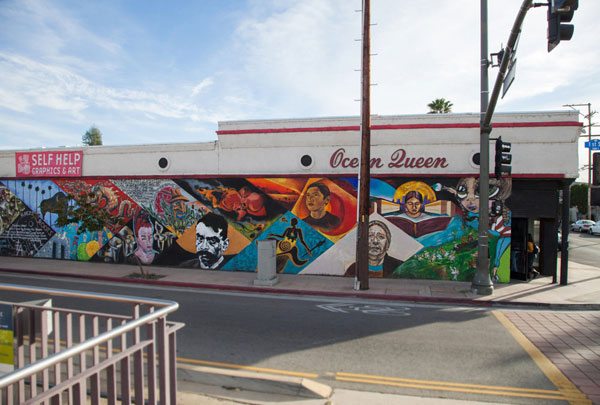
March 12, 2018; Next City
As nonprofits grow or decide to scale up, they often face significant decisions about their physical space, including whether to buy or keep renting. NPQ has looked at this conundrum many times, and one of the most critical questions to be answered is about budget size and the amount of slack within the budget. Buildings impose fixed costs within your budget structure, and those can sometimes crowd out program and budget flexibility. Often, this is too great a risk, unless the building has an undeniable mission-centered rationale, which in this case it does.
With all those considerations, Self Help Graphics & Art decided to commit to a permanent address. Forty-eight years ago, the little arts group was started in a garage on the east side of Los Angeles by a Franciscan nun, Sister Karen Boccalero. She provided job training in silk screening and a platform for Latinx artists. Today, the organization’s mission statement states it’s meant “to drive the creation of new work by Chicano and Latino artists [sic] through fine art printmaking and multiple visual art forms.”
Boccalero and printmakers Carlos Bueno, Antonio Ibañez, and Frank Hernández, among other artists, started the programs in 1970 with a used printing press behind the nuns’ home. They moved three years later to a space donated by the Order of the Sisters of St. Francis in Boyle Heights. The archdiocese sold that property in 2011, and the nonprofit moved again and had to pay rent. They have moved three times since that garage beginning.
There was another point to consider in the rent-or-buy decision; The Boyle Heights community is currently concerned that gentrification is pushing up costs in the mostly residential neighborhood. Betty Avila, the group’s co-director, says, “We already have some pretty clear roots in this location. Do we want to up and move the organization? What does that move mean for a community that’s had so many instances of displacement already?”
The organization’s revenue for the fiscal year July 1, 2015, through June 30, 2016 was $479,562. For the last ten years, the total revenue was $4,024,304, with an average of $365,846. That income has paid for programs and overhead, but there is no room for a mortgage on a southern California property.
In 2014, Self Help Graphics & Art approached the City Council and the Board of Supervisors with a plan to purchase space, hoping for financial backing and, with it, public support for the location. Los Angeles appraised the property, owned by the state of California, at $3.625 million. The nonprofit must have made a strong case, Councilman José Huizar, and Los Angeles County Board of Supervisors (under Supervisor Hilda Solis) voted in late 2017 to help the nonprofit purchase the building with a combined $1.28 million commitment.
Sign up for our free newsletters
Subscribe to NPQ's newsletters to have our top stories delivered directly to your inbox.
By signing up, you agree to our privacy policy and terms of use, and to receive messages from NPQ and our partners.
Self Help secured $2.8 million to invest in the purchase through a $2.05 million loan from the California Community Foundation and a $250,000 loan from the Weingart Foundation, as well as two $250,000 grants from the California Community Foundation and former board member Zac Guevarra.
The $825,000 from the city comes from excess bond proceeds and brings funds raised to the full appraisal price of $3.625 million. The county’s contribution will go toward renovating the building and buying new equipment.
“We felt it was an important win for the community,” says Avila of the city and county support.
Now others can share the experience of past program participants like Arleny Vargas. She first attended a self-defense class before her junior year in Wellesley College and has taken a five-week workshop—Soy Artista, Spanish for “I’m an Artist”—that includes photography as well as stencil and silkscreen printing. The first in her family to attend college, Vargas is now a senior, working on a career in photography.
The organization assists the community in other ways. The printers used their skills to produce materials for the Women’s March in 2017 and, this past September, placed a miniature printing station in the parking lot to make posters in English and Spanish to provide instructions for anyone stopped by Immigration and Customs Enforcement agents after DACA (Deferred Action for Childhood Arrivals) was threatened.
An organization that becomes a part of a neighborhood just might choose to buy their space so they will be there tomorrow. but we sincerely hope it has scheduled in a healthy reserve for building maintenance.—Marian Conway













